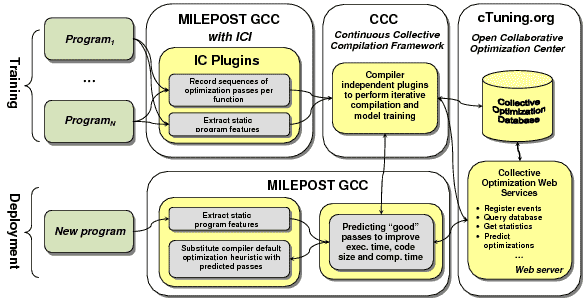From cTuning.org
| Line 11: | Line 11: | ||
<div style="color:red; font-weight:bold; "><H2>MILEPOST GCC is now a part of the [[CTools:CTuningCC|cTuning Compiler Collection (cTuning CC)]].</H2></div> | <div style="color:red; font-weight:bold; "><H2>MILEPOST GCC is now a part of the [[CTools:CTuningCC|cTuning Compiler Collection (cTuning CC)]].</H2></div> | ||
| - | ::::::::::: | + | <div style="font-style: italic; background-color: #FF7F7F"> |
| + | :::::::::''ANNOUNCEMENT:'' After the release of the [[CTools:CTuningCC|cTuning CC (MILEPOST GCC)]] and a relatively quiet summer and autumn 2010 spent mostly on thinking ;), we plan to resume our open collaborative activities in 2011 and will work on a new collaborative platform and a repository cTuning<sub>2</sub>. Currently, we are looking for additional funding to keep it running and to access various new hardware (embedded or HPC systems, GPUs, etc) to perform empirical collective learning and optimization to suggest better program optimizations or hardware designs based on multi-objective criteria (execution time/power/architecture size/code size/compilation time/etc) ([http://fursin.net/wiki/index.php5?title=Research:Dissemination#Fur2009 ref<sub>1</sub>], [http://fursin.net/wiki/index.php5?title=Research:Dissemination#FT2009 ref<sub>2</sub>], [[CDatabase|ref<sub>3</sub>]]), so if you are interested to support cTuning initiative in 2011, please don't hesitate to contact [http://fursin.net/research Dr. Grigori Fursin] (cTuning founder and R&D coordinator). More information will be available at the beginning of 2011.</div> | ||
MILEPOST GCC is the first practical attept to build machine learning enabled open-source self-tuning production (and research) compiler that can adapt to any architecture using iterative feedback-directed compilation, machine learning and collective optimization. It is based on production quality [http://gcc.gnu.org GCC] that supports more than 30 families of architectures and can compile real, large applications including Linux, and on [[CTools:ICI|Interactive Compilation Interface]] that provides plugin system to access internals of compilers. MILEPOST GCC attempts to correlate [[CTools:MilepostGCC:StaticFeatures|program features]] and [[CDatabase|program optimizations]] during empirical iterative compilation to predict good optimizations for unseen programs based on prior learning. MILEPOST and cTuning infrastructure automates code and architecture optimization to improve execution time, code size, compilation time and other characteristics at the same time. This technology is not GCC-dependent and can be used in any compiler using common [[CTools:ICI|Interactive Compilation Interface]] and compiler independent plugins. The first version of the MILEPOST GCC and [[CTools:MilepostFramework|MILEPOST framework]] has been created during the [http://cTuning.org/project-milepost MILEPOST project]. All public MILEPOST developments have been coordinated by [http://fursin.net/research Grigori Fursin]. More information can be found in the following paper about [http://unidapt.org/index.php/Dissemination#FMTP2008 MILEPOST GCC]. | MILEPOST GCC is the first practical attept to build machine learning enabled open-source self-tuning production (and research) compiler that can adapt to any architecture using iterative feedback-directed compilation, machine learning and collective optimization. It is based on production quality [http://gcc.gnu.org GCC] that supports more than 30 families of architectures and can compile real, large applications including Linux, and on [[CTools:ICI|Interactive Compilation Interface]] that provides plugin system to access internals of compilers. MILEPOST GCC attempts to correlate [[CTools:MilepostGCC:StaticFeatures|program features]] and [[CDatabase|program optimizations]] during empirical iterative compilation to predict good optimizations for unseen programs based on prior learning. MILEPOST and cTuning infrastructure automates code and architecture optimization to improve execution time, code size, compilation time and other characteristics at the same time. This technology is not GCC-dependent and can be used in any compiler using common [[CTools:ICI|Interactive Compilation Interface]] and compiler independent plugins. The first version of the MILEPOST GCC and [[CTools:MilepostFramework|MILEPOST framework]] has been created during the [http://cTuning.org/project-milepost MILEPOST project]. All public MILEPOST developments have been coordinated by [http://fursin.net/research Grigori Fursin]. More information can be found in the following paper about [http://unidapt.org/index.php/Dissemination#FMTP2008 MILEPOST GCC]. | ||
Revision as of 21:34, 24 October 2010
 |
MILEPOST GCC |
| machine-learning enabled self-tuning compiler |
Web shortcut: http://cTuning.org/milepost-gcc Navigation: cTuning.org > CTools
MILEPOST GCC is now a part of the cTuning Compiler Collection (cTuning CC).
MILEPOST GCC is the first practical attept to build machine learning enabled open-source self-tuning production (and research) compiler that can adapt to any architecture using iterative feedback-directed compilation, machine learning and collective optimization. It is based on production quality GCC that supports more than 30 families of architectures and can compile real, large applications including Linux, and on Interactive Compilation Interface that provides plugin system to access internals of compilers. MILEPOST GCC attempts to correlate program features and program optimizations during empirical iterative compilation to predict good optimizations for unseen programs based on prior learning. MILEPOST and cTuning infrastructure automates code and architecture optimization to improve execution time, code size, compilation time and other characteristics at the same time. This technology is not GCC-dependent and can be used in any compiler using common Interactive Compilation Interface and compiler independent plugins. The first version of the MILEPOST GCC and MILEPOST framework has been created during the MILEPOST project. All public MILEPOST developments have been coordinated by Grigori Fursin. More information can be found in the following paper about MILEPOST GCC. 
|
|









